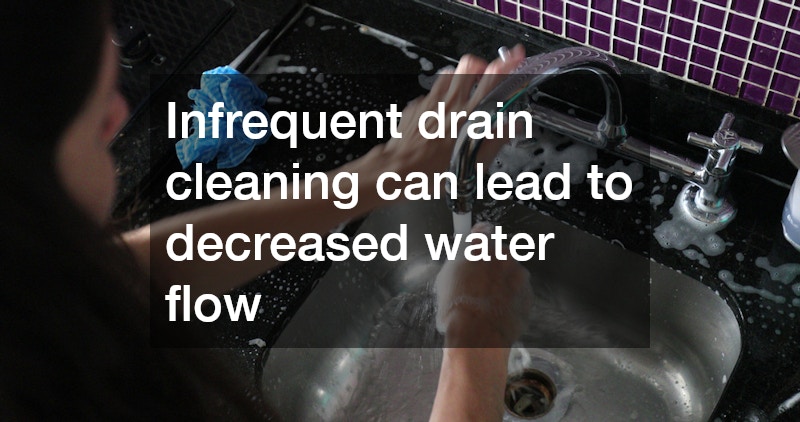Drain cleaning is an essential aspect of home maintenance, ensuring the smooth operation of your plumbing system and preventing costly repairs. This article aims to answer some of the most common questions about drain cleaning, offering practical insights and advice. By understanding the importance of regular maintenance, methods to effectively clean drains, and the consequences of neglect, homeowners can take proactive steps to preserve the functionality of their plumbing systems.
How Often Should You Clean Your Drains?
Frequency of Routine Maintenance
Homeowners are often advised to schedule routine drain cleaning every six months to a year, depending on usage levels. Regular maintenance helps prevent build-up of debris, grease, and other materials that can lead to blockages. Consistently following a maintenance schedule can extend the lifespan of your plumbing system and reduce the need for emergency repairs.
For homes with heavy plumbing usage, such as those with large families, more frequent cleaning may be necessary. Professional plumbers often recommend inspecting high-use areas like kitchen sinks and showers more regularly. This proactive approach can catch potential issues early, allowing for minor cleanings rather than extensive interventions.
Infrequent drain cleaning can lead to decreased water flow and increased vulnerability to severe blockages. Over time, neglecting routine maintenance can cause extensive damage to your plumbing infrastructure. Regularly scheduled cleanings can save homeowners time, frustration, and money.
Warning Signs Your Drains Need Cleaning
One of the most common signs that your drains need cleaning is slow drainage. When water takes longer than usual to flow down the drain, it may indicate a blockage forming in the pipes. Addressing slow drainage promptly can prevent more significant issues later.
Foul odors emanating from sinks, tubs, or showers are another indication that your drains require attention. These odors often arise from trapped food, soap scum, and biofilm building up within drains. Professional cleaning can effectively remove these odors by eradicating the source of the problem.
Another warning sign could be unusual noises such as gurgling or bubbling when water is being used. These sounds can indicate trapped air caused by a blockage somewhere in the drain line. Recognizing these signs early can prevent costly repairs and maintain a healthy plumbing system.
Preventative Measures to Minimize Cleaning
To minimize the frequency of required drain cleaning, homeowners can adopt certain habits and tools. Using drain screens and strainers can catch debris before it enters the pipes, significantly reducing the risk of blockages. Additionally, disposing of grease and food waste correctly can prevent buildup in kitchen drains.
Simple practices, such as running hot water down the drain after each use, can help dissolve any potential build-up. Regularly using a mixture of vinegar and baking soda can also break down minor residues and freshen the drains. These practices can enhance overall drainage efficiency and decrease the likelihood of severe blockages.
Homeowners should also be cautious of what they flush or wash down their drains. Avoiding the disposal of items like sanitary products, wipes, and cotton balls down toilets can prevent clogs. Awareness and proactive behavior can significantly reduce the need for frequent professional interventions.
What Methods Are Most Effective for Drain Cleaning?
DIY Methods for Minor Clogs
For minor clogs, simple household solutions can often be effective. Using a plunger can typically dislodge small blockages, restoring normal water flow. A mixture of baking soda, vinegar, and hot water can also effectively break down mild clogs.
Homeowners can also utilize plumber’s snakes or augers to manually remove blockages. These tools are user-friendly and can be effective in reaching clogs that are deep within pipes. With careful handling, DIY methods can address minor issues without professional intervention.
Preventative practices, such as being mindful of what goes down the drain, complement these home remedies well. Regular light maintenance can prevent bigger issues, making DIY methods a simple and cost-effective solution. When used appropriately, these techniques can extend time between professional cleanings.
Professional Drain Cleaning Options
There are times when professional drain cleaning is not only recommended but necessary. Persistent clogs, recurring issues, or multiple drains backing up could indicate a significant problem that exceeds DIY capabilities. Professionals have access to specialized tools and techniques that can resolve these issues efficiently.
For instance, hydro jetting is a powerful method used by professionals to clear stubborn blockages and clean pipes thoroughly. This technique uses high-pressure water jets to remove build-up, including grease, roots, and debris. It ensures a comprehensive cleaning that DIY methods might not achieve.
When choosing a professional service, it’s important to consider credentials, experience, and reviews. The expertise of a seasoned plumber can provide peace of mind and guarantee effective solutions. Investing in professional cleaning can safeguard your plumbing system’s health in the long term.
Chemical vs. Mechanical Cleaning Methods
Chemical cleaning solutions are often popular due to their accessibility and ease of use. These solutions dissolve clogs by breaking down substances within the pipes. However, frequent use of chemicals can damage pipes over time, leading to more serious plumbing issues.
Mechanical cleaning methods, such as snaking and hydro jetting, are more environmentally friendly solutions. They mechanically remove blockages without the risk of introducing harsh chemicals into your plumbing system. This approach protects both the integrity of the pipes and the environment.
Ultimately, the choice between chemical and mechanical methods depends on the specific circumstances. For minor issues, chemical solutions might suffice, but mechanical methods are preferable for larger or recurring problems. Consulting with a professional can help in determining the best approach for your situation.




